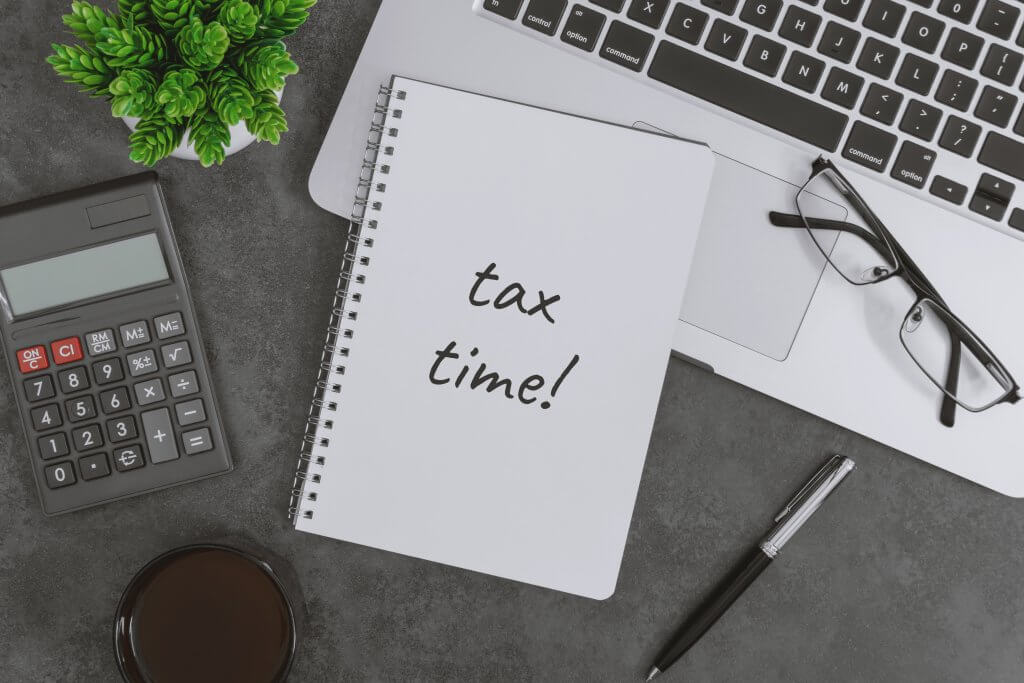
Are you looking for an accurate tax associate job description? If you are earning a degree where you will specialize in accounting or taxation, it is important to research the associate-level positions that you will be qualified to fill once you earn your degree. Tax associates may also be called tax preparers or specialists depending on which financial service company you research, but all of these titles are interchangeable and the job duties are similar in nature.
Who Do Tax Associates Work With?
Associates who specialize in taxation will work with small business owners and individuals to prepare income tax filings and to verify that the individual or business is in compliance with tax regulations. Tax associates may be employed by a financial services firm or self-employed to offer their own preparation services. Many associates provide walk-in services to the general public.
What Are the Job Duties of a Tax Preparer/Associate?

A tax preparer will sit with clients to interview them regarding their annual income and expenses so that they can file the correct form, prepare filings, and include as many deductions as possible to reduce the client’s tax obligation. In addition to interviewing the client, the associate will use financial records and other statements to use adjustments and keep the person or company’s tax liability as low as possible while still complying with the tax law.
It is very important for a tax specialist to be familiar with the IRS guidelines and accounting principles to successfully work in the field. They will use their knowledge of the guidelines and principles and their familiarity with tax preparation software to file tax forms electronically for quick processing. If the filing comes back for errors, the associate will correct the errors until it is accepted. Most financial services companies will handle audits if they were the preparer on file.
At some firms, tax associates are responsible for recruiting new clients or selling additional services to existing client. Associates also need to understand the firm’s billing structure and provide accurate service quotes based on the customer’s needs. Larger firms may have other employees who handle client acquisition and billing so that tax specialists can focus on preparing tax returns, but some employees prefer working at a smaller firm and performing a wider range of duties.
As tax associates become more experienced, their duties will change. They may move from simple tax returns for small businesses to more complex firms. They may also need to supervise newer associates or junior staff. At larger firms, it’s possible to move into management and spend little or no time preparing tax returns, but most tax associates would rather spend their workday focused on taxes instead of meeting with other managers and planning long-term business strategies. Fortunately, tax associates receive a high base salary, so there is limited financial pressure to move into a less-enjoyable role.
How to Become a Tax Associate

While a bachelor’s degree is not required by some financial services companies, most will prefer to hire associates who possess a bachelor’s degree in accounting or a related finance field. You will take coursework in economics, income taxation, statistics, public administration, and finance. As an associate, you need to be able to follow tax preparation procedures while using advanced software systems.
A Bachelor’s in Accounting degree program will prepare you for the field so that you can apply the knowledge that you learn about taxation, tax systems, regulations and standards. If you are an independent and detail-oriented worker who can effectively communicate with clients in a professional manner, you will be on your way to landing your first job as a tax associate. Individuals who require a lot of micromanagement should pursue another occupation.
In addition to earning a degree in accounting, business or taxation, aspiring tax associates can also pursue extracurricular training. Almost all tax associates need to understand Microsoft Office products, particularly Microsoft Excel, so students often take additional Excel classes, use the program in their personal life or look for online resources to learn Excel. Additionally, associates often use accounting programs like Intuit QuickBooks or NetSuite as well as tax preparation software. Real-life experience using these programs can move a tax preparer’s resume to the top of the stack, so students should look for professional internships or part-time jobs while working on their accounting degrees.
Steps to Earn Certified Tax Associate Credentials
The Internal Revenue Service (IRS) requires certain credentials for any tax associate who files returns. Tax associates must apply to receive a preparer tax identification number (PTIN). This entails taking the Registered Tax Return Preparer test with a $116 fee. This 2.5-hour exam evaluates tax associates’ mastery of Form 1040 series preparation skills. Once passed, tax associates must complete at least 15 continuing education units annually to stay up-to-date on code changes.
Are there other requirements for tax associates? In some cases, yes. Twenty U.S. states have licensing regulations tax associates must fulfill. For example, the New York State Tax Department registers every tax preparer practicing statewide. Added certifications are available from tax industry leaders like H&R Block and Jackson Hewitt. Tax associates can also become Enrolled Agents (EAs) by taking the Special Enrollment Examination and passing a suitability check.
Reasons to Consider Becoming a Tax Associate
CNBC recently found that 90 percent of surveyed Americans couldn’t answer straightforward tax-related questions. Taxes are tricky tasks that confuse most everyday folks outside the accounting world. Nonetheless, most of the 209.12 million U.S. residents age 18 and older must file tax returns. Tax associates benefit from great job security because taxes won’t disappear or become any easier. Tax associates can build a vast client base for continual work year-round. Tax associates usually have high job satisfaction from helping people minimize their tax liability and get helpful refunds.
Though the busiest tax season runs from January to April, tax associates may have leeway to build part-time work schedules in slower months. Tax associates have the freedom to become self-employed independent contractors without a demanding boss. The recession-proof job is perfect for parents with young children who wish to avoid big childcare bills. Tax associates earn competitive pay with few education requirements. Since a bachelor’s degree isn’t necessary, few tax associates struggle with student loan debt. Tax associates also can utilize their experience for upward mobility into other accounting roles.
Advancement Opportunities for Tax Associates
Some tax associates own their own tax preparation store, either as an independent business or through a franchising agreement with a national company. Running a business requires many of the same skills as preparing taxes; owners must be financially savvy, organized and familiar with business and employment laws. Business owners must be prepared for management duties, such as hiring and supervising new employees, obtaining licenses and permits from government agencies and ensuring customer satisfaction. Owners of tax preparation companies must also find a way to balance the busy months at the start of the calendar year with low-revenue months in the latter half of the year. If owners overcome these challenges, they’ll be rewarded with a very high income as well as strong relationships with customers and employees.
Many of the best tax associates do not want to own their business, either because they don’t want the added responsibilities or because they enjoy their work so thoroughly. Luckily, the field of accounting offers many opportunities for career advancement. After five years of higher education, tax specialists can pursue licensure as a Certified Public Accountant, or CPA, by passing a challenging test and meeting other requirements in their states. Once licensed, CPAs can offer a range of accounting services, including tax preparation, either as independent providers or through a financial firm. While many CPAs follow a traditional career path by entering college right after high school, tax preparers bring a unique skillset to the profession through their tax expertise and customer service background.
Average Salary Potential for Tax Associates
The Bureau of Labor Statistics (BLS) reports a mean annual wage of $49,550 for all income tax preparers, including tax associates. That’s higher than the median worker income of $39,810. America’s 66,670 tax associates receive an average hourly wage of $23.82. The bottom 10 percent of tax associates generate mean yearly earnings of $21,750. The top 10 percent of tax associates reap median annual profits of $87,060. Most tax associates fall between the $28,450 and $63,070 mark.
Tax preparation services firms provide an average salary of $49,230. Tax associates at consulting companies make mean compensation of $56,990. Tax associates at legal services employers earn $59,250 on average. Financial investing brokerages offer the biggest median pay of $74,920 per year. Top-paying states for tax associates are New York, Colorado, Massachusetts, Alaska, and California. These top five states offer mean yearly salaries of $58,700 to $65,580.
While the BLS tracks salaries on an annual basis, these numbers don’t paint a complete picture. Many tax preparers work part-time in the field during the busy spring months. Tax specialists who work in March, April and May can enjoy almost limitless overtime, meaning it’s possible to earn tens of thousands of dollars in a few short months. Employees who report earning the lowest salaries of around $20,000 are very likely only working for a short time period each year.
Skills Every Successful Tax Associate Must Have

The day in the life of a tax associate requires many different skills. Tax associates need strong organizational and multi-tasking skills to work on multiple client cases without mixing up 1099 or W2 forms. Analytical skills help tax associates accurately transfer data from wage statements to tax returns, interpret complex tax laws and combine a pile of crumpled receipts and invoices into a clean, comprehensible document. While computer software will perform most of the math involved in tax return preparation, associates still need basic math skills to understand what the computer is doing and double-check its work for accuracy. Almost every tax firm uses computer programs to prepare taxes, and the IRS encourages all tax preparers to use electronic delivery, so basic computer skills are
The correct attitude is also important for tax preparers. Because tax preparation is a highly regulated legal field, tax specialists must be willing to consult legal references rather than relying on gut instincts. Customers do not always understand or agree with tax law, so employees must be willing to politely educate tax filers without becoming argumentative. Specialists also need a willingness to learn because tax regulations change yearly.
Alternate Careers with a Tax Associate Background
Not everyone is suited to the fast pace and long hours of the tax preparation season, especially when raising children. Luckily, the education and skills needed to become a tax associate are useful in many other professions, particularly in the finance and business sector. Tax associates often transition to other financial services, such as investment management, client management for financial firms and accounts payable/receivable. These positions all require attention to detail, willingness to learn complex and ever-changing legal regulations and customer service skills.
With additional education, tax associates can also find a lucrative career in law. Tax law is highly complicated, even for fully trained attorneys, so a background in tax preparation can assist law school graduates with mastering this challenging field. While this career path requires three years of graduate education, it is extremely lucrative; attorneys at large firms command six-figure salaries.
Government Jobs for Tax Associates
Although government agencies do not employ tax associates to assist the public with preparing taxes, many government employers value the skills and experience that tax specialists can bring to the workforce. The Internal Revenue Service (IRS) is a natural fit and always need experience tax experts to answer questions from the general public. Additionally, the Federal Bureau of Investigation (FBI) appreciates the analytical skills of accountants, especially as the need for forensic accountants grows. While government agencies can’t offer the high salaries of private finacial firms, they do provide reliable employment and regular schedules, making a government job a good mid-career switch for tax associates looking for a less-hectic job.
Demand for accountants is projected to grow by six percent in the next eight years, according to the Bureau of Labor Statistics. Accountants who specialize in examining financial records and prepare tax filings can choose between work for a financial services company or and self-employment. As the profession grows, tax associates will continue to enjoy the many career opportunities in the world of finance.
Related Resources:
- Top 50 Best Associates in Accounting Online
- Top 10 Affordable Online Master’s in Finance Degree Programs
- Top 50 Most Affordable Online MBA in Finance Degree Programs
- 50 Great Small Colleges for an Accounting and Finance Degree
- 5 Reasons to Become an Auditor
- How Can I Get a Job as an Auditor for the IRS?
- How Do You Become a Certified Internal Auditor?
- 50 Great Small Colleges for an Accounting and Finance Degree
